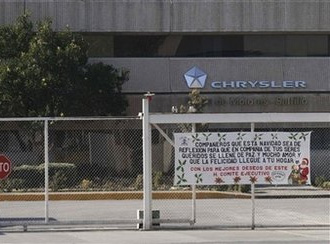
|  |  |  Business News | December 2008 Business News | December 2008  
U.S. Exports Its Auto Struggles to Mexico
 Alexandra Olson - Associated Press Alexandra Olson - Associated Press
go to original


| | A Christmas message is left on the closed entrance of the Chrysler assembly plant in Ramos Arizpe, northern Mexico, Thursday, Dec. 18, 2008. This plant, like others in Mexico have been temporarily closed for the month of January to save costs and bring inventories in line with demand. Message reads in Spanish 'Colleagues, may this Christmas be of reflection so that in the company of your loved ones you fill with peace and much love and may happiness reach your homes, best wishes from the executive committee.' (AP/Monica Rueda) |  |
Mexico City - The U.S. auto bailout lifts the threat of imminent collapse from plants that have been a steady source of jobs in Mexico. But the rescue, backed by American taxpayers, is likely to slow investment in Mexico's auto industry, one of the fastest-growing in the world.

Lured by low labor costs, Detroit's automakers have been critical to an industry that makes up 3 percent of Mexico's gross domestic product and accounts for a fifth of its exports. The 13 plants run by Ford, Chrysler and GM account for more than half of Mexico's auto production.

Although nothing in the $17.4 billion U.S. government loan package prohibits expansion outside the United States using taxpayer money, it would most likely lead to a huge backlash.

"They really need this money, so my guess is that they will try to stay away from making new investments in Mexico in the short term because it would look very bad," said Juan Pablo Fuentes, an economist with Moody's Economy.com.

U.S. lawmakers have made clear that they expect U.S. automakers to keep jobs at home. And they have leverage: $4 billion of the auto loan package will be made available only if Congress votes to release $350 billion that remains in the financial industry bailout fund.

"I think they are very much aware of Congress' concerns and would do nothing untoward that would in essence breach the trust that we have extended to them," said U.S. Rep. Sheila Jackson-Lee, D-Texas.

Mexico is heavily reliant on exports to the U.S. Three-quarters of vehicles produced in Mexico are exported, 70 percent of them to the United States, according to the Mexican Auto Industry Association. As U.S. auto sales plummeted, Mexican auto exports fell nearly 8 percent in November and production declined 2.1 percent.

General Motors Corp., which employs about 12,700 in Mexico, released more than 600 workers when it stopped making the Suburban at its plant in Silao this year. Chrysler LLC, which employs about 5,000, laid off 800. Both companies said they will idle several Mexican plants in January to cut costs and shrink inventories.

The auto association asked the Mexican government for a $3 billion loan to loosen credit for dealers and customers in an effort to boost flagging sales in Mexico. November sales fared even worse than exports, plunging almost 20 percent.

Yet there is little that automakers can do to boost demand in Mexico amid a lethargic economy, said Luis Flores, an economist at Mexico's IXE Group Financiero SA. Diversifying Mexico's export market, as the auto association has urged, is a long-term goal that will not save automakers from a dismal 2009, he said.

"The reality is that all of 2009 will be a very bad year for automakers no matter what their market strategies are," Flores said.

That erases for Mexico what had been an engine of economic growth.

Since the 1990s, wages as low as $1.50 an hour helped lure an average of about $2 billion per year in foreign investment in the auto industry. Today, it employs 500,000 directly or indirectly.

Mexico remains strategically well-positioned once the auto market recovers.

Already, Mexican plants are switching from gas-guzzling trucks to fuel-efficient compact cars.

Ford Motor Co. is retooling its Cuautitlan Assembly Plant to build its new Fiesta subcompact, part of a $3 billion investment that will create 4,500 jobs in Mexico. In July, GM opened a plant in San Luis Potosi to churn out the compact Chevrolet Aveo and Pontiac G3. And Chrysler is building a $570 million plant in Saltillo for new Phoenix motors intended for fuel-efficient models under development. |

 |
|  |



